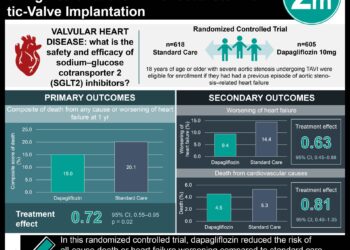Higher doses of heart failure guideline-directed medical therapy prescribed to patients with acute heart failure admission are associated with better outcomes
1. Higher doses of guideline-medical therapy (GDMT) within 2 weeks after discharge from an acute heart failure (AHF) admission were associated with a reduction in 180-day heart failure (HF) readmission, all-cause death, and quality of life (QOL) at 90 days.
2. Patients in high-intensity care (HIC) with higher GDMT doses at week 2 also had fewer adverse events to day 90.
Evidence Rating Level: 1 (Excellent)
Study Rundown: The Safety, Tolerability, and Efficacy of Rapid Optimization, Helped by N-Terminal Pro–Brain Natriuretic Peptide (NT-proBNP) Testing of Heart Failure Therapies (STRONG-HF) trial demonstrated the safety and efficacy of an intensive strategy involving the rapid optimization of GDMT and close follow-up after AHF admission, resulting in reduced risks of death or heart failure readmission and improved quality of life. This is important as the occurrence of AHF is linked to a significant likelihood of both readmission and mortality. However, despite recommendations for GDMT uptitration, not all patients achieved the prescribed dosage at week 2 post-discharge, prompting this post hoc secondary analysis to explore the association between the level of GDMT uptitration and the study’s outcomes. This study found a positive correlation between increased doses of GDMT for HF and improved outcomes, in addition to an increase in patients’ quality of life. The most favorable results were observed in individuals who received an average dose of 90% or more of the maximally recommended medication doses. There were three kinds of HF medications used in this STRONG-HF trial: renin-angiotensin system inhibitors (RASis), β-blockers (BBs), and mineralocorticoid receptor antagonists (MRAs). The study is limited by its inability to assess the effects of two novel medications, angiotensin receptor-neprilysin inhibitors and sodium-glucose transport protein 2 inhibitors (SGLT2is), as the prescription of RASi medications depended on individual center preferences and SGLT2i medications were not widely prescribed due to lack of approval. In conclusion, this analysis shows that when feasible and safe, efforts should be made to rapidly uptitrate patients with AHF to optimal doses of HF medications.
Click to read the study in JAMA Cardiology
Click to read an accompanying editorial in JAMA Cardiology
In-Depth [randomized controlled trial]: This study is a post hoc secondary analysis of a multinational, open-label, randomized trial, STRONG-HF, that was conducted between May 2018 to September 2022 and had the data analyzed between January to October 2023 of 515 patients assigned HIC. The STRONG-HF trial’s inclusion criteria comprised admission for AHF within 72 hours before screening, hemodynamic stability regardless of left ventricular ejection fraction, elevated NT-proBNP levels exceeding 1500 pg/mL, and the absence of optimal oral heart failure therapy at specified time points before admission, screening, and just before randomization, which typically occurred within two days before expected hospital discharge. The composite of the first heart failure rehospitalization or all-cause death within 180 days was the study’s primary endpoint. Secondary endpoints included the assessment of changes in the EQ-5D visual analog scale score from baseline to day 90, 180-day all-cause death, and the composite occurrence of the first HF rehospitalization or all-cause death at day 90. In the HIC group, each 10% increase in the average percentage of optimal dose served as a continuous time-dependent covariate, leading to a reduced risk of 180-day HF readmission or all-cause death with an adjusted hazard ratio of 0.89 (95% CI, 0.81-0.98; P = 0.01). It was also observed in patients with higher GDMT doses that there was more improvement in quality of life. Patients in the HIC group prescribed higher HF GDMT doses at week 2, experienced fewer adverse events, with a significant decrease in occurrence from week 2 to day 90 observed in higher-dose categories (P < .001).
Image: PD
©2024 2 Minute Medicine, Inc. All rights reserved. No works may be reproduced without expressed written consent from 2 Minute Medicine, Inc. Inquire about licensing here. No article should be construed as medical advice and is not intended as such by the authors or by 2 Minute Medicine, Inc.







